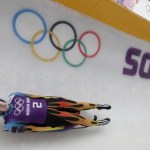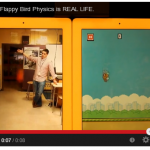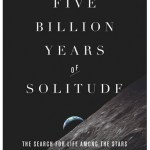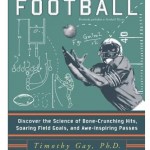Pop Culture
In the Uncertain Dots hangout the other day, Rhett and I went off on a tangent about the physics of the Olympics, specifically the luge. If you're not familiar with this, it's basically psycho sledding: people riding tiny little sleds down a curved track at 80mph.
The "featured image" above shows Erin Hamlin of the US women's luge team during a training run (AP photo from here); she went on to win a bronze medal, the US's first in individual luge, so congratulations to her. The photo gives you an idea of what's involved: tiny sled, icy track, curved walls.
(In the Winter Olympics context,…
One of the more annoying points of contention back in the days of the Sokal hoax and the "Science Wars" was an argument over social construction. This is, loosely speaking, the idea that our understanding of the world is not strictly rational and objective, but is heavily influenced by interactions with other people, and the culture in which we live. The idea originally arose in literary academia, but expanded to be applied to basically everything, including science.
At bottom, this is probably the best and most useful idea to come out of whatever collective "-ism" you want to use to refer…
A couple of days ago, John Scalzi posted a writing advice open thread, asking people to share the best advice they'd gotten on the craft of writing. There's a lot of good stuff in there, much of it fairly specific to fiction writing-- stuff about plotting, the use of synonyms for "said," how to keep track of who's speaking, etc. As someone who's very much an outsider to that side of the writing business, it's interesting to read, but not that directly useful (I do have long stretches of dialogue in the How-to-Teach books, and occasionally needed to worry about the "said" thing there, but that…
It's taken me a disgracefully long time to finish the review copy of Lee Billings's Five Billion Years of Solitude I was sent back in the fall, mostly because I didn't read anything not immediately related to the book-in-progress for most of November and all of December. Which is to say, the long delay is not in any way a reflection of the quality of this book, which is excellent.
The title comes from the observation that the span from when life arose on Earth to the distant future when the expanding Sun will swallow the planet entirely is around five billion years. The span when the planet…
Unless you've been marooned on a desert island for the last couple of weeks-- or, you know, foreign-- you're probably at least dimly aware that the Super Bowl is this evening. This is the pinnacle of the football season, and also the cue for lots of people to take to social media proclaiming their contempt for the Super Bowl, NFL football, or just sports in general. This can occasionally be sort of amusing, as with Kyle Whelliston's "Last Man" game, but usually, it's just kind of tedious. The AV Club has pretty much the only necessary response, namely that Nobody Cares That You Don't Care…
Kameron Hurley did a blog post on what it took her to become a writer, which I ran across via Harry Connolly's follow-up. These are fairly long, but well worth reading for insight into what it means to be a writer-- and they're both very good at what they do. You should buy their books, right now.
As always, reading these made me feel really guilty. Maybe I ought to add "the writing life" articles to the list of topics I just don't read, with "Let's make fun of religious people!" and "The Higgs boson is the greatest thing since sliced bread!" Except unlike those two, which just irritate me,…
I've gotten out of the habit of blogging about the books I read for fun here, mostly because I've gotten out of the habit of reading for fun. Not for lack of desire, but because between my job and the kids and the massive amounts of research reading for the book-in-progress, I haven't had time.
Of course, I make the occasional exception, and when one of my very favorite SF authors comes out with a new one, that's a great reason to read a little fiction. Robert Charles Wilson isn't the most prolific author, but he's consistently excellent, and always thought-provoking, so I was very happy to…
When I wrote about Benjamin Bratton's anti-TED rant I only talked about the comment about the low success rate of TED suggestions. That was, admittedly, a small piece of his article, but the rest of it was so ludicrously overheated that I couldn't really take it seriously. It continues to get attention, though, both in the form of approving re-shares on my social media feeds, and in direct responses such as a rebuttal from Chris Anderson himself and most recently a long piece by Christiana Peppard at Medium, which are getting their own collection of approving re-shares. So I guess I ought to…
This past Monday, a lot of people in my social media feeds were passing around this Benjamin Bratton piece about the problems with TED, blasting the whole phenomenon as "placebo technoradicalism." The whole thing, he claims, is shallow pseudo-inspirational bullshit that makes people feel nice, but doesn't actually lead anywhere. As he notes at the opening, most of the grand promises made in TED talks have yet to pan out: "So much potential and enthusiasm, and so little actual change."
I found this kind of amusing, because a day earlier the link being passed around a lot of my social media…
I sent off the complete draft of the book-in-progress yesterday, somewhere between 12 and 36 hours ahead of my contractual deadline. Which I suppose makes it a book-in-process now, maybe. That process may still include re-writes, though, so my work probably isn't done yet.
The final draft, according to Word anyway, comes to 253 pages (space-and-a-half) and 96,807 words. I don't remember the word count from the original contract, but this is more than that. Which is pretty typical of my writing, really.
Because I wrote it down as part of the final checks, here's the approximate table of…
"Daddy, I wanna play with the robot dog!"
"It's not a dog, honey, it's an Imperial walker. An AT-AT. A fearsome armored assault transport used to overwhelm the Rebel defenses in the battle of Hoth."
"..."
"..."
"..."
"OK, fine, you can play with the robot dog."
We came down to my parents' for Thanksgiving this year, because both Kate and I are really busy with work at the moment, and didn't need the additional stress of planning and hosting a big dinner. On Friday morning, my dad went up into the attic and dug out the bags containing the vast collection of Star Wars toys my sister and I…
I'm not talking about the tv show Eureka here, which was mostly silly fluff but not especially problematic. I'm talking about the famous anecdote about Archimedes of Syracuse, who supposedly realized the principle that bears his name when slipping into a bath, distracted by a problem he had been assigned by his king. On realizing the solution, he (supposedly) leaped out of the tub, yelling "Eureka!" (usually translated as "I found it!") and ran home naked, because he was so excited about the discovery that he forgot to dress.
As you know, I'm working on a book about the relationship between…
I am crushingly busy right now-- massive book rewrites needed, papers to grade, etc.-- so I've actually been fairly happy with the general lack of topics that inspire a deep desire to blog. which of course, was promptly upset this morning, when a brief outburst of hating on Carl Sagan erupted on Twitter just as I was about to head to the gym.
The catalyst was the hoopla surrounding the donation of Sagan's papers to the Library of Congress, which though it isn't specifically cited was the cause of a flurry of Twitter discussion that I think led to Erin Podolak's anti-Sagan manifesto, which in…
It's that time of year again when people start thinking about Halloween costumes-- SteelyKid is apparently planning to re-use her Peter Pan outfit from last year-- and the conceptual costumes post from a while back has proved enduringly popular at this time of year. If you're not into conceptual art, though, maybe some historical cosplay is more your thing, so here are some totally serious ideas if you want to go to your local physics department's Halloween party as one of the great physicists of the last half-millennium.
Sexy Niels Bohr
This was actually the trigger for this post, when…
Yes, that's another TED@NYC picture as the "featured image," but don't run away! It's a post about science, I swear!
The photo up above is from the Flickr set (which, by the way, has been edited significantly since yesterday...), and I like it a good deal. Mostly because, as the joking caption suggests, that photo of Max Planck looming over my head has a kind of serial killer vibe to it. But here's the thing: this is the original phtoo that's on the slide:
Max Planck around the time he solved the black-body radiation problem. From wikimedia.
It's a black-and-white photo from 1901, and in…
The nice folks at TED have put up a giant Flickr set of pictures from last week's event. I'm not sure it's complete, but I happened to notice it this morning, and it already had several pictures of me in it, which is all I really care about. I particularly like the "featured image" above, which kind of makes me look like some kind of quantum demagogue urging my electrons on to more efficient production of interference patterns like the one over my shoulder.
But I also like this one, in which a deranged Max Planck looms behind me like a serial killer:
Max Planck knows what I did last summer…
I'm doing a bit of work on an idea for physics outreach, which would involve tying a discussion of modern physics to science fiction stories. I have Opinions about this sort of thing, of course, but I also have readers who might think of things I don't. So, let me throw this out to you all:
What is your favorite example of a science fiction story (here meaning print, movie, or television) making use of ideas from quantum physics? What's your least favorite?
My favorite stories invoking QM ideas are probably Robert Charles Wilson's brilliant "Divided by Infinity" (which I will draw heavily on…
Over the weekend, before the whole Scientific America debacle blew up, Ben Lillie tweeted:
Looking for science news pegs that aren't "a paper was published." Good examples? #ScioOcean #scionew
— Ben Lillie (@BenLillie) October 12, 2013
This is, of course, a familiar problem to a lot of people who care about the public dissemination of science. The need for a good "hook" is a constant issue, because without one, you can't get anyone to pick up a story. And you can't let one get past, either, leading to a frantic scramble whenever anything happens that has the slightest connection to science…
The TED@NYC trip took me to Manhattan on Monday for the run-through of my talk that night, but then I was left in The City all day Tuesday with time to kill. My original plan was to go to the Guggenheim Museum, as I've never been there and it's an iconic building, but there was a note on their web page that the ramps were closed in preparation for some exhibit, and I figured that would sort of ruin the point, so I went to the Museum of Modern Art instead.
If you know me at all, those might seem odd choices, as modern art really isn't my thing. The MOMA is heavy on pieces that "Call into…
I'm sure I've done more than enough wibbling about TED for this week, but the only major physics story at the moment involved the Higgs boson, and I'm thoroughly sick of that. So let's talk about Malcolm Gladwell and journosplaining.
Gladwell has a new book out, David and Goliath that from all reports is pretty much exactly what you expect from a Malcolm Gladwell book. I greatly enjoyed the digested read by John Crace in the Guardian. Among the many bad reviews of this were a trio by my colleague at Union, Christopher Chabris-- first a paywalled review in the Wall Street Journal, then a post…








